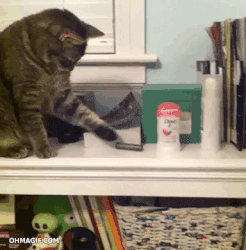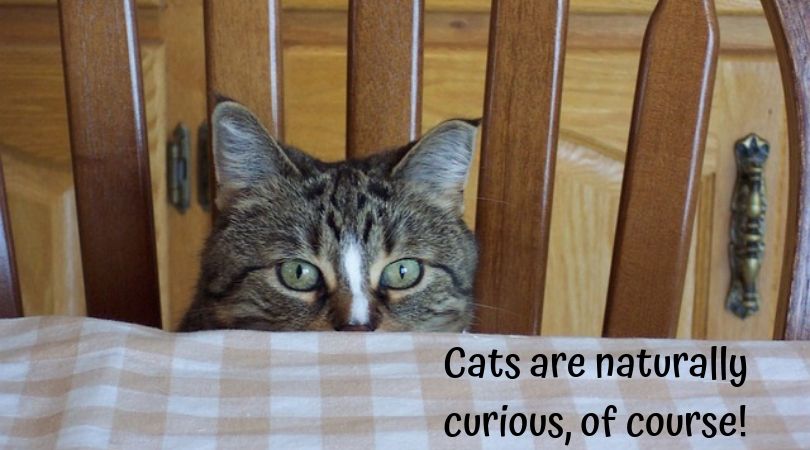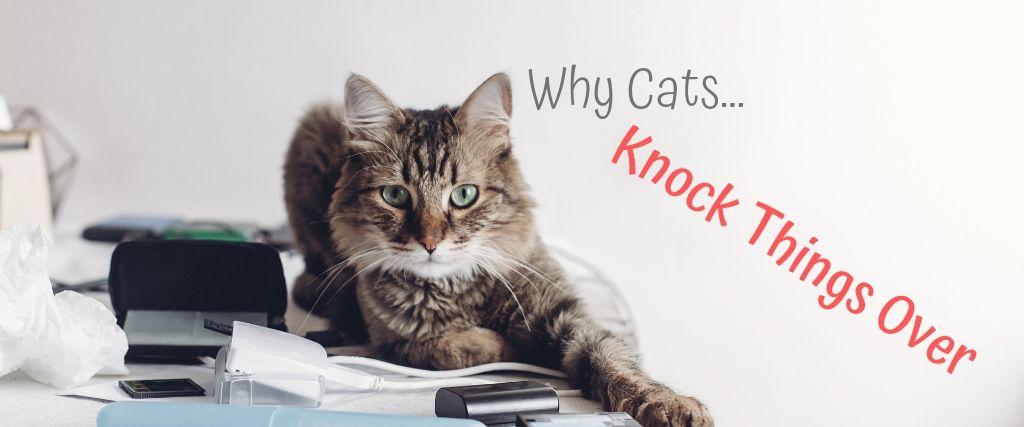Whether you find it amusing or frustrating - or a little of both - the fact is if you own a cat, they are going to knock objects off any elevated surface, such as your desk or a table. Are they simply trying to be annoying, or is there a reason for this behavior? Dog people will use this as an example of how cats are not intelligent and a reason not to like them. Even some cat people may not understand this behavior and find it frustrating. However, there are several reasons that contribute to why cats do this. Let’s explore this cutely problematic behavior to figure out why cats do it, and what can be done to prevent it.
Hunting Instinct
Cats are natural born hunters, and their prey instinct is a big contributor to this behavior. Let’s take that paperweight sitting on your desk. If that paperweight was a mouse, your cat needs to investigate it. She needs to bat it around to test it out and make sure it’s something of interest to eat. She needs to test it for movement and see if it’s alive or dead. She needs to figure out how she is going to kill it and eat it, or if it’s too dangerous and may fight back and cause her injury. Is it sick or rotten? 
Your cat knows the difference between a mouse and the paperweight, but their hunting instinct is too strong and they need to investigate things with their paws. It doesn’t matter if your cat is an indoor pet and has never seen a mouse before; they all have this prey instinct.
One option to try to help satisfy your cat’s instincts and get them to leave your paperweight alone (at least some of the time) is to provide them some catnip mice toys. Food puzzles are another option that can present a challenge to your cat and give them the fulfillment of getting a reward for their efforts.
Connecting With You
Another reason for this behavior is to seek your attention. They learn from experience that any time they knock that pen or cup off the table, you react. This is attention for them. Whether the reaction is positive, such as getting food or water put in their dish, or negative, such as you scolding them, it’s attention.
To help alleviate this, try to spend some more time with your cat in other ways to encourage other attention-seeking behavior. This can be with chin scratches, brushing, or some play time. If they do knock things over, try not to react to them at all.
Curiosity and Fun: Fighting Boredom
Any time there is a change in your cat’s environment, she will want to explore these new changes. Did you just get a new candleholder? Your cat wants to know what that new object is all about and will explore it with her paws. Did you recently tidy up and rearrange items in your office? She wants to check out these new changes to know what’s going on. Cats are very smart and curious animals, and any changes to their environment, no matter how subtle, they will pick up on and investigate.
Investigating various objects on your desk also becomes a game for her. What will happen to this pencil when I swat it? How about this business card? These objects become a form of mental stimulation for her.

Both this curiosity and need for fun can be signs of boredom. There are steps you can take to help alleviate your cat’s boredom. Put some of her toys around the house to explore so she becomes interested in those instead of your pencils. Cycle these toys, putting some away for a while and replacing with different ones so the toys become “new” again to her. This creates new items for her to explore instead of the items on your desk.
Give your cat lots of things to do, such as a perch with a view of the bird feeder. Again, treat or food puzzles are a great form of mental stimulation. Look into other toy options, and most importantly, try to schedule playtime with your cat.
There is no guarantee that these tactics will completely stop your cat from knocking things off of your desk, but they could definitely help.
Try to Pet-Proof Your Home
Some items that your cat may knock over can be dangerous to them. Sharp objects should not be placed near the edges of tables or shelves. Glass objects can shatter. Try to remove any of these items that can pose a risk to your cat. Houseplants should be placed in sturdy containers so that they cannot be pushed over.
As mentioned before, try not to react in any manner when your cat does knock something over. Do not reinforce the behavior with any attention. This may be difficult to do, but keep reminding yourself. It may be beneficial to wait until later to pick it up when she isn’t there. If the item is dangerous and needs to be picked up immediately, do so calmly without acknowledging your cat. Try turning your back to her while picking up.
It may not be possible to completely eliminate this behavior in your cat, but hopefully with this information you will be able to reduce it. Remember to contact your veterinarian with any behavior questions or challenges you may have.

